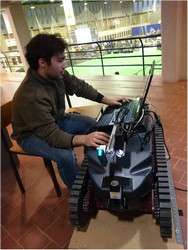Engineers design robot to carry out tricky manual operations in the challenging shipbuilding environment

Large semi-structured manufacturing spaces present serious challenges to robot mobility and reliability. This is certainly the case in modern shipbuilding, which makes considerable use of prefabricated sections. Entire multi-deck segments of the hull or superstructure are built in shipyards, transported to the building dock and then lifted into place.
This is known as block construction, and involves arduous repetitive and potentially dangerous manual work. Introducing automation into complex working environments such as shipbuilding has so far proved difficult to achieve. The CARLOS project, which was officially completed in August 2015, aimed to address this by of developing adaptable robotic solutions.
Preliminary trials have shown positive results. The robot co-worker prototype developed by CARLOS was shown to be able to carry out specific operations and perform semi-autonomous navigation inside ship blocks. Using information from a computer-aided design file, the robot can automatically perform stud welding and mark information onto cabin walls to support fit-out operations (to equip the cabin as needed) by personnel, using the selected manipulator and a commercial welding gun tailored attached to the wrist.
The breakthrough was achieved through the application of recent advances in cooperative mobile robotics to complex industrial scenarios, and through the innovative use of off-the-shelf technology. Using this methodology, the CARLOS project successfully developed a final prototype capable of carrying out operations inside blocks of ship superstructures. The innovation promises to make modern shipbuilding safer and more efficient.
The robot also has potential applications in other industrial and civil construction sectors that use metallic structures. In this way, the project will contribute to strengthening the market position of European SMEs that develop, supply, and integrate mechatronic, sensing, and electronic technologies for industrial applications.
CARLOS's work has already received industry recognition, recently winning first prize in the FreeBots competition held at the Festival Nacional de Robótica, a Portuguese national robotics competition that aims to show off cutting edge R&D.
Specific requirements on process sensing (such as accurate orientation of the tool) have been assessed, confirming the effectiveness of the components selected for carrying out the tasks. By successfully automating stud welding and marking in outfitting operations in shipbuilding, the CARLOS project hopes to increase productivity, reduce faults and increase the competitiveness of European ship fit out and other civil construction-based businesses.
More information: For further information, please visit the CARLOS project website: carlosproject.eu/
Provided by CORDIS




















